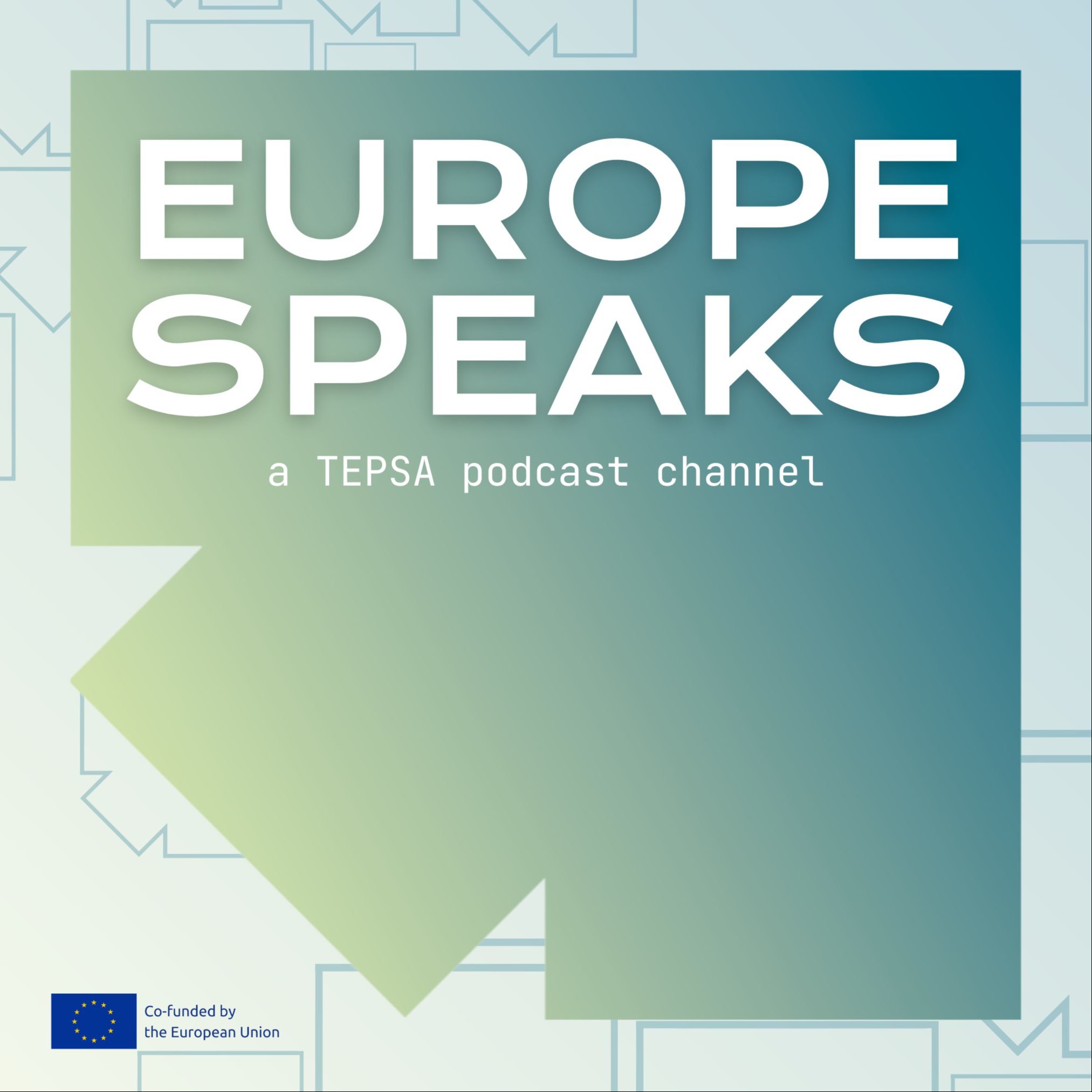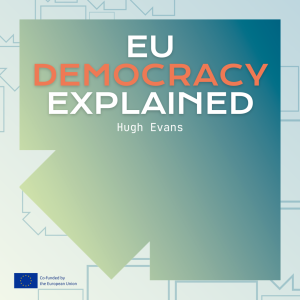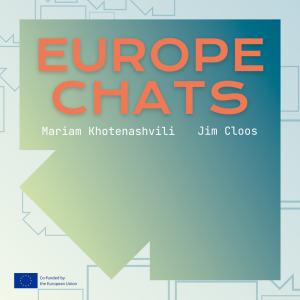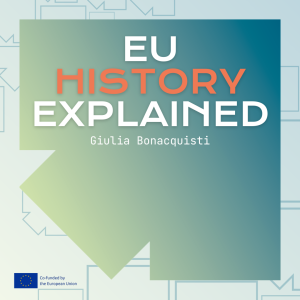
Welcome to ‘Europe Speaks’, a podcast channel by the Trans European Policy Studies Association (TEPSA) where we explore everything to do with the European Union: history, current affairs, and the future of Europe. We publish regular podcasts on all these topics, including EuropeChats with Jim Cloos and Mariam Khotenashvili, and a series of other webinars, explainers, and interviews with the world’s leading experts on the EU!
Episodes

Wednesday Dec 06, 2023
EU Democracy Explained – Is the EU Democratic? Part 1 – the European Commission
Wednesday Dec 06, 2023
Wednesday Dec 06, 2023
In this new series from the Trans European Policy Studies Association (TEPSA), Hugh Evans explores the the ways democracy weaves its way in and out of the EU system.
This first episodes revolves around a crucial and unique EU institution: the European Commission. We will explore how the Commission works, learn about its history, and discover how a proposal gets passed in the institutional triangle. In addition, we will explore an important element of what makes the EU democratic: accountability. Many people worry that the Commission is not accountable, but despite the caricature of 'Brussels bureaucrats', the truth is very different - this video explains how accountability is crucial in the European Union.
EU Democracy Explained is a series where we delve into detail about what democracy actually is and how it works in Europe, and ask ourselves: “what makes the EU democratic?”
Script, Recording & Editing: Hugh Evans
Music: Wondershare Filmora X
Co-funded by the European Union. Views and opinions expressed are however those of the author(s) only and do not necessarily reflect those of the European Union or European Education and Culture Executive Agency (EACEA). Neither the European Union nor the granting authority can be held responsible for them.

Monday Jul 03, 2023
Monday Jul 03, 2023
This episode of EuropeChats is a discussion between Jim Cloos, TEPSA Secretary-General and former Director General for General and Institutional Policy at the General Secretariat of the Council, and TEPSA Executive Director Mariam Khotenashvili. The discussion focuses on a topic which comes around every six months in EU affairs: the Rotating Presidency of the Council of the European Union.
The Rotating Presidency is system whereby each of the 27 EU Member States takes turns in chairing various formations of the Council of the European Union. Each Presidency lasts six months and always has its own priorities. The system is a way for Member States to each hold the reins of a key EU Institution on an equal basis, and the Presidency plays a key role in many of the legislative achievements of the European Union.
In particular this episode is a discussion on the history, role, and relevance of the Rotating Presidency, drawing on Jim Cloos' longstanding involvement in Presidencies, first as a Luxembourgish diplomat, then as a European diplomat. Together, Mariam and Jim explore the support each Presidency gets from the General Secretariat of the Council, what challenges Presidencies may face, what opportunities they have to make a difference, and they try to answer a key question: what makes a good Rotating Presidency?
At the time of this episode's publication, Spain has just taken the reins of the Rotating Presidency from Sweden. For the coming six months, the new Presidency will have to tackle a number of challenges both at the national and European elections, not the least of which is a national election in Spain set for July 23. TEPSA has been working hard to give concrete recommendations to the Spanish Presidency, via the holding of a Pre-Presidency Conference in Madrid at the start of June, and via the presentation of a set of policy recommendations in various areas. To learn more about the Recommendations from Members of the TEPSA Network to the Spanish Presidency, check out our website: https://www.tepsa.eu/recommendations-from-members-of-the-tepsa-network-to-the-spanish-presidency/
EuropeChats is the flagship podcast of TEPSA and it is part of the TEPSA Podcast Channel “Europe Speaks”
Music: Worakls, 22 September 2014, Salzburg, Hungry music
This video is co-funded by the Citizens, Equality, Rights and Values programme of the European Union
Co-Funded by the European Union.

Friday Jun 16, 2023
Friday Jun 16, 2023
This episode of EuropeChats is a discussion between Frank Schimmelfennig, Professor of European Politics at ETH Zürich, and TEPSA Executive Director Mariam Khotenashvili. The discussion focusses on building a new future for EU enlargement. With the accession agenda firmly in the foreground of European politics once again, thanks to the new candidacy of Ukraine and Moldova, it is more crucial than ever to explore the ins and outs of enlargement policy, and discuss how to improve it.
In particular, an in the context of potential future enlargement in the Western Balkans, the discussion focusses on the update to enlargement methodology which was made in 2020 for the purpose of reinvigorating the accession process for candidates in that region. In addition, Mariam and Frank discuss the thorny issues of the EU’s “absorption capacity”, the prospect of “staged accession”, and the costs of non-enlargement geopolitically, economically, and in terms of the EU’s internal functioning.
This episode is a discussion with Prof. Frank Schimmelfennig. Frank is Professor of European Politics and a member of the Center for Comparative and International Studies at ETH Zürich. He is a leading expert on all things EU integration, and a key protagonist in the current debate about the accession process and enlargement policy writ-large. His new book, “Integration and Differentiation in the European Union”, was recently published by Palgrave Macmillan.
EuropeChats is is the flagship podcast of TEPSA and it is part of the TEPSA Podcast Channel “Europe Speaks”
Music: Worakls, 22 September 2014, Salzburg, Hungry music
This video is co-funded by the Citizens, Equality, Rights and Values programme of the European Union
Co-Funded by the European Union.

Wednesday May 24, 2023
EU History Explained - From the EEC to today’s European Union
Wednesday May 24, 2023
Wednesday May 24, 2023
In this new episode of EU History Explained, Giulia Bonacquisti, Programme Manager at the Trans European Policy Studies Association (TEPSA), takes a look at the recent history of the European project, with a focus on how we came from debating what form integration should take in the 1960s and 1970s to the formalisation of much of what we recognise today as the European Union through the Single European Act, Maastricht Treaty, and eventually through the Lisbon Treaty, which is still in force today.
In this video, we discuss how, from the purely economic integration project of the European Economic Community, created in 1957, we ended up with today’s European Union: a complex structure comprising not only a single market, but also common policies, as well as rights and obligations for European citizens. Today’s European Union is a polity which, among other things, allows us to circulate freely across Member States, to live and work abroad, to participate in local and European elections in other countries, and to feel part of one big family with our fellow Europeans. But it is also an ongoing process that cannot yet be considered achieved. As the Treaties say, the EU is permanently striving to build “an ever closer union among the peoples of Europe”, and even today a broad debate is taking place about the future of the EU and the reforms needed to make it more effective and closer to citizens, including young people.
EU History Explained is TEPSA’s video series exploring the origins of the modern EU. If you have ever wondered how the European Union of today came to be, or what lies behind the talk of politics being shaped in ‘Brussels’, then this is the series for you!
We would like to thank the Historical Archives of the European Union at the European University Institute for their contribution.
Script: Giulia Bonacquisti
Recording & Editing: Eva Ribera & Hugh Evans
Music: Garrett Bevins - Infinite - Infinite (Wondershare Filmora X)

Thursday Mar 30, 2023
Thursday Mar 30, 2023
This episode of EuropeChats is a discussion between Michele Chang, a Professor at the College of Europe in Bruges, and TEPSA Secretary-General Jim Cloos. The discussion focusses on building a competitive economy for Europe. In the context of TEPSA's recently published European Council Experts' Debrief, which drew together experts from across the TEPSA Network and beyond (including Michele Chang) to analyse the conclusions of the March 2023 European Council, Jim's talk with Michele revolves around the challenges to Europe's economy, and opportunities to make it more resilient in future.
In particular, the discussion surrounds the United States' Inflation Reduction Act (IRA), a source of tension in the trans-Atlantic relationship due to its content which is perceived by European leaders as being too protectionist. The challenge of China also features in the talk on how the EU's economy, dominated as it is by the EU's status as the world's largest trading power, is affected by factors outside its own borders. The discussion then moves on to how the EU might build up the Banking Union and Capital Markets Union, as well as an assessment of the Stability and Growth Pact.
This episode is a discussion with Prof. Michele Chang. Michele is the Director of the Transatlantic Affairs Programme and Professor in the European Political and Governance Studies Department at the College of Europe in Bruges. You can read her contribution to the recent European Council Experts' Debrief, as well as all the other fascinating analyses contained therein, on TEPSA's website.
EuropeChats is is the flagship podcast of TEPSA and it is part of the TEPSA Podcast Channel “Europe Speaks”
Music: Worakls, 22 September 2014, Salzburg, Hungry music
This video is co-funded by the Citizens, Equality, Rights and Values programme of the European Union
Co-Funded by the European Union.

Friday Jan 27, 2023
Friday Jan 27, 2023
This episode of EuropeChats is a discussion between Dr. Kristi Raik, Deputy Director of the International Centre for Defence and Security in Tallinn, Estonia, and TEPSA Executive Director Mariam Khotenashvili. They discussion focusses on building European security against Russia. In the context of Russia’s ongoing war of aggression against Ukraine, the EU has since February 2022 been thrust into a new and vital debate on how to deal with an expansionist Russia which has initiated the first land war in Europe since the Second World War.
In particular, the discussion surrounds the recent Joint Agreement on EU-NATO Cooperation, the reasons why Western military support to Ukraine has been given in such small steps, and why decisions such as sending German Leopard tanks to Ukraine was fraught with indecision. In addition, the two discuss whether there is any prospect for a normalisation of relations with Russia in the wake of a Ukrainian victory, or even after Putin’s rein comes to an end, whether in the short or long term. What is the role of the EU in this war? How can it step up its support to Ukrainian forces? How can Ukraine’s European future be ensured?
This episode is a discussion with Dr. Kristi Raik. Kristi is a TEPSA Board Member and Deputy Director of the International Centre for Defence and Security, where she is also the Head of the Foreign Policy Programme. The discussion occurs on the basis of a paper Kristi recently co-authored with Martin Hurt entitled “Building European Security Against Russia – A View From Estonia”.
EuropeChats is is the flagship podcast of TEPSA and it is part of the TEPSA Podcast Channel “Europe Speaks”
Music: Worakls, 22 September 2014, Salzburg, Hungry music
Co-Funded by the European Union.

Friday Dec 16, 2022
EuropeChats – EU-Russia Relations | Special Talk with Heidi Hautala
Friday Dec 16, 2022
Friday Dec 16, 2022
This episode of EuropeChats is a special talk between Heidi Hautala MEP, Vice-President of the European Parliament, and Jim Cloos & Mariam Khotenashvili, on the subject of the European Union's response to Russia's war of aggression against Ukraine. In the context of a recently published book coordinated by TEPSA, "Russia and the Future of Europe: Views from the Capitals", we discuss a number of questions surrounding the war.
In particular, the discussion surrounds the current measures taken by the EU, including 8 sanctions packages, financial & equipment support to Ukraine's struggle, and the crucial granting of EU Candidacy status to Ukraine, as well as what the EU can do to better support Ukraine in the ongoing war. In addition, the recent recognition of the European Parliament that Russia is a state sponsor of terrorism forms an important part of the discussion: what does this mean in practice, and what can the EU do to further punish Russia for its aggression?
This episode is a special talk with Heidi Hautala, Finnish MEP for the Group of the Greens/European Free Alliance, and Vice-President of the European Parliament. MEP Hautala is serving her fifth term in the European Parliament and has dealt for many years with international trade, EU external relations, human rights, development, legal affairs and the EU budget.
EuropeChats is is the flagship podcast of TEPSA and it is part of the TEPSA Podcast Channel “Europe Speaks”
Music: Worakls, 22 September 2014, Salzburg, Hungry music

Tuesday Nov 29, 2022
EU History Explained - European Foreign Policy: The Birth of the CFSP
Tuesday Nov 29, 2022
Tuesday Nov 29, 2022
In this new episode of #EUHistoryExplained, Giulia Bonacquisti, Project Manager at the Trans European Policy Studies Association (TEPSA), takes a look at the role the United States played in the history of European integration.
In this podcast, we investigate how this informal cooperation formed in the so-called European Political Cooperation will lead over recent decades to today’s Common Foreign and Security Policy. Two main Treaties are significant in this more recent development of European foreign policy: Maastricht, signed in 1992 and establishing the European Union proper. As part of this Treaty, one of its three 'pillars' becomes Common Foreign and Security Policy. Year later, when the Lisbon Treaty is signed in 2007 and comes into force in 2009, the Common Security and Defence Policy is born and the EU is granted legal personality, meaning it can conclude international agreements. But the road is not so smooth: in this episode we discover yet more challenges posed in the road to a European foreign policy. This episode is the second in a two-part series on European Foreign Policy.
EU History Explained is TEPSA's series exploring the origins of the modern EU. If you have ever wondered how the European Union of today came to be, or what lies behind the talk of politics being shaped in 'Brussels', then this is the series for you!
We would like to thank the Historical Archives of the European Union at the European University Institute for their contribution.
Script: Giulia Bonacquisti
Recording & Editing: Eva Ribera & Hugh Evans
Music: Garrett Bevins - Infinite - Infinite (Wondershare Filmora X)

Monday Nov 28, 2022
Monday Nov 28, 2022
In this new episode of #EUHistoryExplained, Giulia Bonacquisti, Programme Manager at the Trans European Policy Studies Association (TEPSA), takes a look at the history of a difficult policy area for Europe: foreign policy.
A sensitive subject for European countries in the wake of World War II, foreign policy integration has a storied history and remains a key area of discussion in the modern European Union. In this podcast, we take a look back to the early days of the European project, mapping proposals and developments, both failed and successful, to further integrate European states in the foreign policy field. In a context of a war-weary post-war European continent, a new geopolitical factor in NATO, and rising Cold War tensions, European leaders' efforts to integrate their countries' foreign policy was no less complex. This episode, the first in a two-part series on the history of European foreign policy, deals with the initial steps on the way to a European foreign policy, and a series of unsuccessful attempts in the early years to development in the 1970s of certain informal cooperation practices – the so-called European Political cooperation.
EU History Explained is TEPSA's series exploring the origins of the modern EU. If you have ever wondered how the European Union of today came to be, or what lies behind the talk of politics being shaped in 'Brussels', then this is the series for you!
We would like to thank the Historical Archives of the European Union at the European University Institute for their contribution.
Script: Giulia Bonacquisti
Recording & Editing: Eva Ribera & Hugh Evans
Music: Garrett Bevins - Infinite - Infinite (Wondershare Filmora X)

Tuesday Nov 22, 2022
Tuesday Nov 22, 2022
This episode of EuropeChats focusses on the foreign and security policy of the European Union, in particular the transformation it has gone through since the start of Russia's war of aggression against Ukraine. This episode was recorded in November 2022 shortly after the Ukrainian liberation of Kherson. With Ukraine’s victory becoming more and more plausible, TEPSA Executive Director asks special guest Benjamin Tallis where the EU and its 27 Member States stand between unity and division. How ready are they to support Ukraine in the coming months?
This episode is a special interview with Benjamin Tallis, research fellow at the German Council on Foreign Relations (DGAP). He focuses on the politics of European security, particularly concerning the European Neighbourhood, borders and migration. He previously worked for the EU on security missions in Ukraine and the Balkans and was policy officer at the European Centre of Excellence for Civilian Crisis Management in Berlin. He also worked at the Institute of International Relations in Prague and contributed to drafting the EU Global Strategy in 2016.
EuropeChats is is the flagship podcast of TEPSA and it is part of the TEPSA Podcast Channel “Europe Speaks”
Music: Worakls, 22 September 2014, Salzburg, Hungry music
